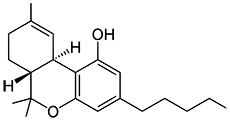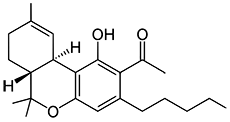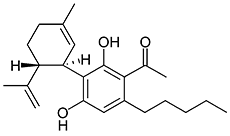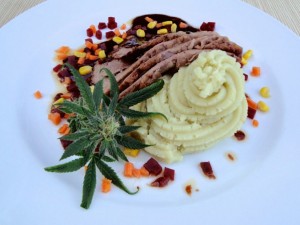Decarboxylation of Cannabis
Natural cannabis contains a wide variety of phytocannabinoids, compounds which bind to cannabinoid receptors in the body and contribute to the high felt when cannabis is consumed. One interesting thing to consider is that the majority of these compounds do not dissolve in water, but were produced in a plant whose leaves and stems are saturated with water and require it to survive. So how were they biosynthesized in a plant if they are not soluble in water?
One proposed solution is that while in the living cells of the cannabis plant these cannabinoids are almost entirely present as their carboxylic acids which are water soluble.
 Tetrahydrocannabinol (THC) Insoluble in water, active in man. |
 Cannabidiol (CBD) Insoluble in water, active in man in conjunction with THC. |
 Tetrahydrocannabinolic acid (THCA) Soluble in water, inactive in man. |
 Cannabidiolic acid (CBDA) Soluble in water, inactive in man. |
After cannabis is harvested and cured, these carboxyl groups begin to degrade, releasing CO2 and leaving behind the desired decarboxylated active cannabinoids. Drying, aging, and heat all contribute to break this carboxyl group down, which is why fresh cannabis is typically cured and then smoked for maximum potency.

But what if you’re consuming the cannabis in a different manner, for instance in brownies or in an alcohol tincture? Then additional care must be taken to ensure the inactive cannabinoids such as THCA and CBDA are decarboxylated into the desired THC and CBD. This is especially important with lower quality cannabis that has not been properly cured, and will likely contain significant amounts of carboxylated cannabinoids as a result.
The good thing is that it’s quite easy to accomplish. Most recipes recommend heating ground cannabis in oil or butter, or a layer of roughly ground cannabis can be put on a baking sheet and put in a pre-heated oven at 200°F (~93°C) for five minutes which will dry and heat the cannabis sufficiently to improve the potency of the resulting product. This is especially important for alcohol tinctures, which typically are not heated as part of the preparation process unlike a baked good such as a brownie.

